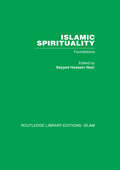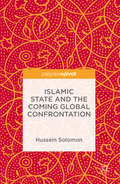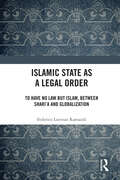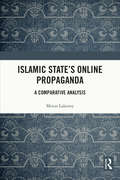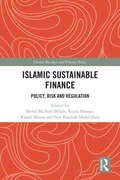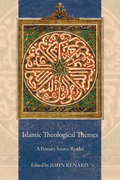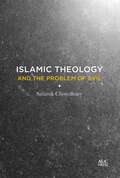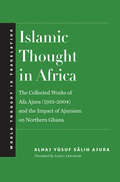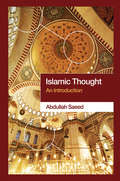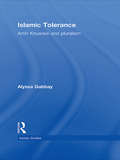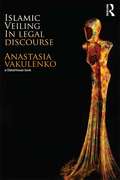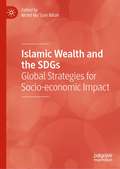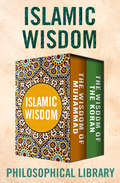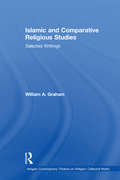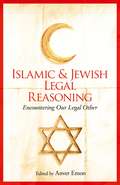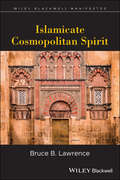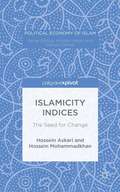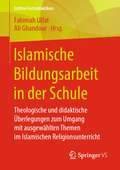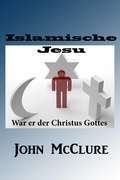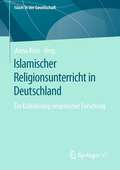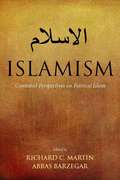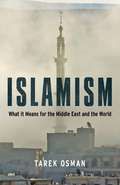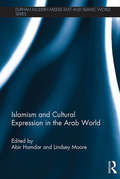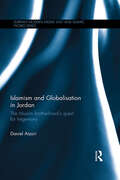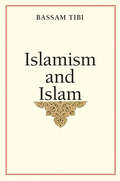- Table View
- List View
Islamic Spirituality: Foundations (World Spirituality Ser. #Vol. 20)
by Seyyed Hossein NasrOriginally published 1987. The first part of the volume is concerned with "The Roots of the Islamic Tradition and Spirituality". These are seen to include the Qu’ran as the central theophany of Islam, the Prophet who received the word of God and made it known to mankind and the rites of Islam. The second part examines the divisions of the Islamic community with their distinctive pieties and emphases: Sunnism and Shi’ism and female spirituality. Part III is devoted to Sufism – its nature and origin, its early development, its various spiritual practices and its science of the soul.
Islamic State and the Coming Global Confrontation
by Hussein SolomonThisbook analyzes the origins and organizational structure of Islamic State (IS), examiningits military triumphs and success in securing new recruits via social media. Fromits base in Iraq and Syria, IS has spread globally with 17 regional affiliatesfrom Indonesia to Nigeria and sleeper cells in at least 60 countries, capableof atrocities like the Paris attack. To understand the threat of IS, this book exploresits organizational structure and underlying ideology, and implications forWestern efforts to attack the leadership of IS. The ways IS has grown byswiftly adapting its military strategy, developing creative forms of funding andefforts to win hearts and minds of locals are identified. The author highlightshow the competing individual national interests between the Western militaryalliance and local partners have served to strengthen IS. With its ideologyspreading ever further, this book warns of the looming violent confrontationbetween democratic and Islamist forces. This volume speaks to academics ininternational relations, security studies and strategic studies, policy-makersand interested parties.
Islamic State as a Legal Order: To Have No Law but Islam, between Shari’a and Globalization
by Federico Lorenzo RamaioliThis book explores the legal dimension of the Islamic State, an aspect which has hitherto been neglected in the literature. ISIS’ dystopian experience, intended as a short-lived territorial and political governance, has been analyzed from multiple points of view, including the geopolitical, social and religious ones. However, its legal dimension has never been properly dealt with in a comprehensive way, assuming as a point of reference both the Islamic and the Western legal tradition. This book analyzes ISIS as the expression of a potential though never fully realized legal order. The book does not describe ISIS’ possible classifications according to the standards and the criteria of international law, such as its possible statehood or proto-statehood, issues that are however touched upon. Rather, it analyzes ISIS’ own legal awareness, based on the group’s literary materials, which show a considerable amount of juridical work. Such material, mainly propagandistic in its nature, is essential in understanding which kind of legal order ISIS aimed at establishing. The book will be of interest to students and academics in the fields of Law, International Relations, Political Sciences, Terrorism Studies, Religion and Middle Eastern Studies.
Islamic State's Online Propaganda: A Comparative Analysis
by Miron Lakomy'Explaining the means utilized by the editors of the Islamic State’s online magazines to win the "hearts and minds" of their audiences, this book is a result of a multidimensional content analysis of two flagship periodicals of the IS.' Dabiq and Rumiyah. Drawing from a number of theoretical concepts in propaganda studies, the research uses comparative analysis to understand the evolution of the modus operandi employed by the editorial staff. The volume evaluates the types of arguments used in these magazines, as well as the emotions and behaviour that these triggered in readers. This book concentrates on the formats and thematic composition of a variety of the Islamic State’s e-periodicals, including Dabiq, Rumiyah, Dar al-Islam or Konstantiniyye, from the viewpoint of the constantly changing strategic situation and priorities of the "Caliphate." The e-magazines of the post-territorial phase of the Islamic State, e.g. From Dabiq to Rome and Youth of the Caliphate, were also taken into consideration. Overall, this book does not only offer new insights into the propaganda methods of the Islamic State’s periodicals, but it also summarizes their rise and fall between 2014 and 2019. The volume is dedicated mostly to academics and postgraduate students specialized in terrorism studies, political violence and security studies.
Islamic Sustainable Finance: Policy, Risk and Regulation (Islamic Business and Finance Series)
by Mohd Ma’Sum Billah Rusni Hassan Razali Haron Nor Razinah Mohd ZainThe central idea of sustainability in the modern world is intricate and ever-changing. Closely related to the realm of finance and socioeconomic discussion, the phrase “sustainable impact finance” has become increasingly popular among bankers, practitioners, financial analysts, investors and the relevant experts seeking an impactful connection between the best financing mechanisms or tools and sustainable development related investments or projects.This book opens up the discussion by offering a Shari’ah-compliance perspective. It is a primer on how Islam addresses and offers solutions to the challenges facing us within the spirit of maqasid al-Shari’ah, among others, in tackling poverty, food supply, health and well-being, quality education, reducing inequalities, responsible consumption and production and climate action. It discusses the connection between Islamic sustainable finance and the Sustainable Development Goals (SDGs) and explains the strategic action-plan of Islamic banks towards achieving Islamic sustainable finance.The book considers the relevant policies and regulations, evaluating the role of regulators, discussing jurisprudential solutions and focusing on the role of Islamic banking standards in relation to Islamic sustainable finance. Further, it explores the issue of risk mitigation and the effective role of Takaful. It presents a practical case study from the banking industry in Malaysia, which evaluates the carbon footprint of bank loans and climate change risk mitigation. Finally, it highlights sustainable finance innovations in an Islamic concept.The book will appeal to advanced students, researchers and scholars of Islamic banking and finance, as well as those concerned with environmental social governance and Sustainable Development Goals research. Regulators, policy makers and Shari’ah-compliant practitioners will also find it to be a useful guide.
Islamic Theological Themes
by John RenardComprised of primary sources assembled from a broad chronological and geographic spectrum, Islamic Theological Themes is a comprehensive anthology of primary Islamic sacred texts in translation. The volume includes rare and never before translated selections, all freshly situated and introduced with a view to opening doors into the larger world of Islamic life, belief, and culture. From pre-theological material on the scriptural end of the spectrum, to the more practical material at the other, John Renard broadens our concepts of what counts as "Islamic theology," situating Islamic theological literature within the context of the emerging sub-discipline of Relational/Comparative Theology. Divided into five parts, students and scholars will find this collection to be an indispensible tool.
Islamic Theology And The Problem Of Evil
by Safaruk ChowdhuryA rigorous study of the problem of evil in Islamic theology Like their Jewish and Christian co-religionists, Muslims have grappled with how God, who is perfectly good, compassionate, merciful, powerful, and wise permits intense and profuse evil and suffering in the world. At its core, Islamic Theology and the Problem of Evil explores four different problems of evil: human disability, animal suffering, evolutionary natural selection, and Hell. Each study argues in favor of a particular kind of explanation or justification (theodicy) for the respective evil. Safaruk Chowdhury unpacks the notion of evil and its conceptualization within the mainstream Sunni theological tradition, and the various ways in which theologians and philosophers within that tradition have advanced different types of theodicies. He not only builds on previous works on the topic, but also looks at kinds of theodicies previously unexplored within Islamic theology, such as an evolutionary theodicy. Distinguished by its application of an analytic-theology approach to the subject and drawing on insights from works of both medieval Muslim theologians and philosophers and contemporary philosophers of religion, this novel and highly systematic study will appeal to students and scholars, not only of theology but of philosophy as well.
Islamic Thought in Africa: The Collected Works of Afa Ajura (1910-2004) and the Impact of Ajuraism on Northern Ghana (World Thought in Translation)
by Alhaj Yusuf Ajura Zakyi IbrahimThe first book length-work on Afa Ajura and translation of his complete poems This is the first English translation of and commentary on the collected poems of Alhaj YŠ«suf á¹¢Ä?liḥ Ajura (1910–2004), a northern Ghanaian orthodox Islamic scholar, poet, and polemicist known as Afa Ajura, or “scholar from Ejura.” The poems, all handwritten in Arabic script, mainly in the Ghanaian language of Dagbani and also Arabic, explore the author’s socio†‘religious beliefs. In the accompanying introduction, the translator examines the diverse themes of the poems and how they challenge TijÄ?niyyah Sufi clerics and traditional practices such as idol worship.
Islamic Thought: An Introduction
by Abdullah SaeedIslamic Thought is a fresh and contemporary introduction to the philosophies and doctrines of Islam. Abdullah Saeed, a distinguished Muslim scholar, traces the development of religious knowledge in Islam, from the pre-modern to the modern period. The book focuses on Muslim thought, as well as the development, production and transmission of religious knowledge, and the trends, schools and movements that have contributed to the production of this knowledge. Key topics in Islamic culture are explored, including the development of the Islamic intellectual tradition, the two foundation texts, the Qur’an and Hadith, legal thought, theological thought, mystical thought, Islamic Art, philosophical thought, political thought, and renewal, reform and rethinking today. Through this rich and varied discussion, Saeed presents a fascinating depiction of how Islam was lived in the past and how its adherents practise it in the present. Islamic Thought is essential reading for students beginning the study of Islam but will also interest anyone seeking to learn more about one of the world’s great religions.
Islamic Tolerance: Amir Khusraw and Pluralism (Iranian Studies)
by Alyssa GabbayAlthough pluralism and religious tolerance are most often associated today with Western Enlightenment thinkers, the roots of these ideologies stretch back to non-Western and premodern societies, including many under Muslim rule. This book explores the development of pluralism in Islam in South Asia through the work of the poet, historian and musician Amir Khusraw and sheds new light on how Islam developed its own culture of tolerance. Countering stereotypes of Islam as intrinsically intolerant, the book provides a better understanding of how rhetorics of pluralism develop, which may aid in identifying and encouraging such discourses in the present. Khusraw, a practicing Muslim who showed great affection toward Hindus and used much indigenous imagery in his poetry, is an ideal figure through whom to explore these issues. Addressing issues of ethnicity, religion and gender in the early medieval period, Alyssa Gabbay demonstrates the pre-modern precedents for pluralism, conveying the broad sweep of Perso-Islamicate culture and the profound transformations it underwent in medieval South Asia. Accurately depicting the paradoxicality and jaggedness involved in the development of its composite culture, this book will have great relevance to scholars and students of Islam in South Asia, gender, religious pluralism, and Persian literature.
Islamic Veiling in Legal Discourse
by Anastasia VakulenkoIslamic Veiling in Legal Discourse looks at relevant law and surrounding discourses in order to examine the assumptions and limits of the debates around the issue of Islamic veiling that has become so topical in recent years. For some, Islamic veiling indicates a lack of autonomy, the oppression of women and the threat of Islamic radicalism to western secular values. For others, it suggests a positive autonomous choice, a new kind of gender equality and a legitimate exercise of one’s freedom of religion – a treasured right in democratic societies. This book finds that, across seemingly diverse legal and political traditions, a set of discursive frameworks – the preoccupation with autonomy and choice; the imperative of gender equality; and a particular western understanding of religion and religious subjectivity – shape the positions of both proponents and opponents of various restrictions on Islamic veiling. Rather than take a position on one or the other side of the debate, the book focuses on the frameworks themselves, highlighting their limitations
Islamic Wealth and the SDGs: Global Strategies for Socio-economic Impact
by Mohd Ma’Sum BillahThe SDGs, developed by the UN in 2012, focuses on 17 goals for the betterment of humanity and humanitarian causes. Among the core objectives of Shari'ah in Islamic finance is to offer a helping hand, emphasizing the efforts and scope of the SDGs. This book explores how Islamic ethical wealth is structured to contribute to the SDGs and an overall socio-economic impact within the principles of Maqasid al-Shari’ah. Focusing areas such as Islamic micro-finance, wealth inclusion, corporate and agro-Zakat, Awqaf, SRI Sukuk, and green Sukuk, this book will feature contributions from the leading researchers in sustainability and Islamic finance and will be of interest to scholars, researchers, industrialists, NGOs, UNDP and students studying both areas.
Islamic Wisdom: The Wisdom of Muhammad and The Wisdom of the Koran (Wisdom)
by Philosophical LibraryAn inspirational anthology that draws on sacred texts to provide essential insight into Islam, one of the world&’s great religions.The Wisdom of Muhammad: This compelling examination of the life and sayings of Muhammad offers the modern reader a guide to the history and principles of the world&’s second largest religion. Covering a diverse range of topics, from marriage and civic charity to the individual&’s relationship to God and the afterlife, the Prophet&’s words dispel misconceptions about Islam and its teachings. The Wisdom of the Koran: Representing the ultimate authority on almost every issue in Muslim life, the Koran&’s lessons and parables offer moral and spiritual guidance to the faithful. In this essential guide, readers learn about key chapters such as &“The Night Journey&” and &“The Cave&” as well as several stories from Judeo-Christian history.
Islamic and Comparative Religious Studies: Selected Writings (Ashgate Contemporary Thinkers on Religion: Collected Works)
by William A. GrahamWilliam A Graham, a leading international scholar in the field of Islamic Studies, gathers together his selected writings under three sections: 1.History and Interpretation of Islamic Religion; 2.The Qur'an as Scripture, and 3. Scripture in the History of Religion. Each section opens with a new introduction by Graham, and a bibliography of his works is included. Graham's work in Islamic studies focuses largely on the analysis and interpretation of the religious dimensions of ritual action, scriptural piety, textual authority/revelation, tradition, and major concepts, such as grace and transcendence. His work in the comparative history of religion has focused in particular on the 'problem' of scripture as a cross-cultural religious phenomenon that is more complex than simply 'sacred text'. This invaluable resource will be of primary interest to students of the Islamic tradition, especially as regards Qur'anic piety, Muslim 'ritual' practice, and fundamental structures of Islamic thought, and to students of the comparative history of religion, especially as regards the phenomenon of 'scripture' and its analogs.
Islamic and Jewish Legal Reasoning: Encountering Our Legal Other
by Anver EmonBy pairing a scholar of Islamic law with a scholar of Jewish law, a unique dynamic is created. This new perspective not only provides a deeper understanding of the other’s legal tradition, but it also reveals new insights into the one’s own legal tradition, shedding light on what we had previously been too close to observe. Whether for the pursuit of advanced scholarship, pedagogic innovation in the classroom, or simply a greater appreciation of how to live in a multi-faith community, these encounters are richly-stimulating, demonstrating how legal tradition can be used as a common site for developing discussions and opening up diverse approaches to questions about law. Surrounded as we are by political, economic and social dilemmas, it offers a truly incisive model for considering the good, the right and the legal in our societies today. For a thoughtful but circumspect readership, Islamic and Jewish Legal Reasoning is essential.
Islamicate Cosmopolitan Spirit (Wiley-Blackwell Manifestos)
by Bruce B. LawrenceDiscover the essence of the Islamicate Cosmopolitan Spirit and what it has contributed to societies across the ages In Islamicate Cosmopolitan Spirit, author and expert, Bruce B. Lawrence, delivers a spiritual elan filtered through cultural practices and artefacts. Neither juridical nor creedal, the book expresses a desire for the just and the beautiful. The author sets out an original and fascinating theory, that Islamicate cosmopolitanism marks a new turn in global history. An unceasing, self-critical pursuit of truth, hitched to both beauty and justice, its history is marked by male elites who were scientific exemplars in the pre-modern period. In the modern period, these exemplars include women as well as men, artists as well as scientists. The Islamicate Cosmopolitans have had special impact across the Afro-Eurasian ecumene at the heart of civilized exchange between multiple groups with competing yet convergent interests. The Islamicate Cosmopolitan Spirit is a boundary busting challenge to those who think of the world merely in terms of an “Arab” Middle East. Readers will also benefit from: A thorough introduction to the Islamicate Cosmopolitan Spirit across time and space An exploration of premodern Afro-Eurasia and Persianate Culture in the Indian Ocean A practical discussion of the future of the Islamicate Cosmopolitan Spirit Perfect for all students of Islamicate civilization, both traditional and progressive, Islamicate Cosmopolitan Spirit will also earn a place in the libraries of general readers of world history and those grounded in the larger history of Islamicate Asia will find a perspective that centers their own contribution to the Islamicate Cosmopolitan Spirit.
Islamicity Indices: The Seed For Change (Political Economy Of Islam Ser.)
by Hossein Askari Hossein MohammadkhanThe extent of Islamicity, or what Islam demands, is measured to confirm that self-declared Muslim countries have not adopted foundational Islamic teachings for rule-compliant Muslim communities. Western countries, on the other hand, are demonstrated to have better implemented fundamental Islamic teachings for a thriving society.
Islamische Bildungsarbeit in der Schule: Theologische und didaktische Überlegungen zum Umgang mit ausgewählten Themen im Islamischen Religionsunterricht (Edition Fachdidaktiken)
by Fahimah Ulfat Ali GhandourDer Band ermöglicht unterschiedliche Zugänge und Denkkulturen zu verschiedenen theologischen Thematiken, die vordergründig aus einer Bildungsperspektive gedacht werden. Dabei wird die Breite der muslimischen Konzepte in ihrer Pluralität abgedeckt, mit je nach Autorin oder Autor systematischen, philologischen, philosophischen oder historischen Schwerpunktsetzungen, sowie einer pädagogischen Schwerpunktsetzung.
Islamische Jesu-War er der Christus Gottes
by John Mcclure Anil AnwarDer Islam ist eine Religion des Friedens; Jesus gehört zu den anerkannten Propheten. Wenn Jesus der Prinz des Friedens ist, macht, dass ihm einen Muslim, oder wird er Islam personifiziert? Wie auch immer, muss was Jesus zu sagen über unseren Weg zu Gott, der Vater und Paradies? Die Wahrheit zu entdecken ist eine Überzeugung, dass Jesus der Christus, der bestimmte Anweisungen verlassen beachtet werden musste, wie der Prophet empfohlen. Gehen Sie in Ihre Freiheit! Ein großes Buch. Ich genieße die tranlstion dieses Buch. Lesen Sie sie und wachsen Ihren Glauben an den Herrn Jesu Christus.
Islamischer Religionsunterricht in Deutschland: Ein Kaleidoskop empirischer Forschung (Islam in der Gesellschaft)
by Anna KörsDas Buch gibt einen breiten und interdisziplinären Überblick zur empirischen Forschung über den islamischen Religionsunterricht in Deutschland zehn Jahre nach Einführung der Islamischen Theologie an deutschen Universitäten und der Ausbildung von islamischen Religionslehrkräften für den schulischen Religionsunterricht. Damit bietet es einen kaleidoskopischen Blick auf die Vielfalt und unterschiedlichen Facetten vorliegender empirischer Erkenntnisse aus Theologie, Religionspädagogik, Islamwissenschaft, Erziehungswissenschaft, Soziologie und verweist zugleich auf zukünftige Forschungsperspektiven und -bedarfe des noch jungen und dynamischen Forschungsfeldes.
Islamism
by Richard C. Martin Abbas BarzegarAs America struggles to understand Islam and Muslims on the world stage, one concept in particular dominates public discourse: Islamism. References to Islamism and Islamists abound in the media, in think tanks, and in the general study of Islam, but opinions vary on the differences of degree and kind among those labeledIslamists. This book debates what exactly is said when we use this contentious term in discussing Muslim religion, tradition, and social conflict. Two lead essays offer differing viewpoints: Donald K. Emmerson argues that Islamism is a useful term for a range of Muslim reform movements-very few of which advocate violence-while Daniel M. Varisco counters that the public specter of violence and terrorism by Islamists too often infects the public perceptions of Islam more generally. Twelve commentaries, written by Muslim and non-Muslim intellectuals, enrich the debate with differing insights and perspectives.
Islamism
by Tarek OsmanA political, social, and cultural battle is currently raging in the Middle East. On one side are the Islamists, those who believe Islam should be the region's primary identity. In opposition are nationalists, secularists, royal families, military establishments, and others who view Islamism as a serious threat to national security, historical identity, and a cohesive society. This provocative, vitally important work explores the development of the largest, most influential Islamic groups in the Middle East over the past century. Tarek Osman examines why political Islam managed to win successive elections and how Islamist groups in various nations have responded after ascending to power. He dissects the alliances that have formed among Islamist factions and against them, addressing the important issues of Islamism's compatibility with modernity, with the region's experiences in the twentieth century, and its impact on social contracts and minorities. He explains what Salafism means, its evolution, and connections to jihadist groups in the Middle East. Osman speculates on what the Islamists' prospects for the future will mean for the region and the rest of the world. "
Islamism and Cultural Expression in the Arab World (Durham Modern Middle East and Islamic World Series)
by Abir Hamdar Lindsey MooreWhereas most studies of Islamism focus on politics and religious ideology, this book analyses the ways in which Islamism in the Arab world is defined, reflected, transmitted and contested in a variety of creative and other cultural forms. It covers a range of contexts of production and reception, from the early twentieth century to the present, and with reference to cultural production in and/or about Morocco, Algeria, Tunisia, Egypt, Yemen, the Gulf, Lebanon and Israel/Palestine. The material engaged with is produced in Arabic, English and French and includes fiction, autobiography, feature films, television series, television reportage, the press, rap music and video games. Throughout, the book highlights the multiple forms and contested interpretations of Islamism in the Arab world, exploring trends and tensions in the ways Islamism is represented to (primarily) Arab audiences and complicating simplistic perspectives on this phenomenon. The book considers repeated and idiosyncratic themes, modes of characterisation, motifs, structures of feeling and forms of engagement, in the context of an ongoing struggle for symbolic power in the region.
Islamism and Globalisation in Jordan: The Muslim Brotherhood's Quest for Hegemony (Durham Modern Middle East and Islamic World Series)
by Daniel AtzoriThis book explores the activities of the local Muslim Brotherhood in Jordan. It examines how the Brotherhood, working to establish an alternative social, political and moral order through a network of Islamic institutions, made a huge contribution to the transformation of Jordanian society. It reveals, however, that the Brotherhood’s involvement in the economic realm, in Islamic financial activities, led it to engage with the neo-liberal approach to the economy, with the result that the Islamic social institutions created by the Brotherhood, such as charities, lost their importance in favour of profit-oriented activities owned by leading Islamist individuals. The book thereby demonstrates the "hybridisation" of Islamism, and argues that Islamism is not an abstract set of beliefs, but rather a collection of historically constructed practices. The book also illustrates how globalisation is profoundly influencing culture and society in the Arab world, though modified by the adoption of an Islamic framework.
Islamism and Islam
by Bassam TibiDespite the intense media focus on Muslims and their religion since the tragedy of 9/11, few Western scholars or policymakers today have a clear idea of the distinctions between Islam and the politically based fundamentalist movement known as Islamism. In this important and illuminating book, Bassam Tibi, a senior scholar of Islamic politics, provides a corrective to this dangerous gap in our understanding. He explores the true nature of contemporary Islamism and the essential ways in which it differs from the religious faith of Islam. Drawing on research in twenty Islamic countries over three decades, Tibi describes Islamism as a political ideology based on a reinvented version of Islamic law. In separate chapters devoted to the major features of Islamism, he discusses the Islamist vision of state order, the centrality of antisemitism in Islamist ideology, Islamism's incompatibility with democracy, the reinvention of jihadism as terrorism, the invented tradition of shari'a law as constitutional order, and the Islamists' confusion of the concepts of authenticity and cultural purity. Tibi's concluding chapter applies elements of Hannah Arendt's theory to identify Islamism as a totalitarian ideology.
